The Ateneo Molecular Pathology Laboratory (AMPLify) serves as the university’s contribution to the national and global efforts to stem the spread of COVID-19 and, in the long term, to the improvement of health care and diagnostics in the country through research and training. AMPLify will provide routine PCR-based molecular diagnostic testing for COVID-19 with increased testing capabilities and faster results turnaround time.
The Ateneo Molecular Pathology Laboratory (AMPLify) has been given the green light to operate by the DOH Health Facilities and Services Regulatory Bureau effective March 23, 2021. The facility is currently designed for the detection of SARS-CoV-2, the causative agent of COVID-19, using real time RT-PCR. It is a laboratory with Biosafety Level 2 containment designed in accordance with the provisions of the World Health Organization.
“The university exerted great effort and resources getting this project done. Different offices of Ateneo came to our aid to make this project successful,” said Don Malabana, Operations Manager of AMPLify. Malabana credits this facility to the support of top university administrators led by then University President Fr. Jose Ramon Villarin, SJ, current University President Fr. Roberto Yap, SJ, and Vice President for University and Global Relations Fr. Jose Cruz, SJ. Malabana also credits the counsel of top doctors and scientists in Dean Cenon Alfonso of the Ateneo School of Medicine and Public Health, Dr. Toby Dayrit, and Dr. Cris Lopez, among others.
The long road to completion of AMPLify included construction of facilities, hiring and training of laboratory personnel, and procurement and importation of laboratory materials and supplies. “This is impossible without the courageous effort and support from different people led by Dr. Evangeline Bautista (former Dean of the School of Science and Engineering [SOSE]), Dr. Emilyn Espiritu (Director of the Ateneo Research Institute for Science and Engineering [ARISE]), and Dr. Greg Cortez (Director of AMPLify),” Malabana said. Cortez adds that the team is also grateful to Temasek Foundation for their generous donation of equipment and state-of-the-art technology required in the performance of molecular testing.
AMPLify is designed to provide service for routine PCR-based molecular diagnostic testing for COVID-19 with increased testing capabilities with emphasis on faster turnaround time for results. “The purpose of the detection is either to confirm infection (i.e. risk-based swabbing) or for clearance required for other purposes like travel and employment (i.e. elective swabbing),” says Dr. Espiritu.
The facility employs a socialized scheme for its testing fees and will provide free testing for adopted marginalized communities. Espiritu shares, “AMPLify aims to allocate 15% of its weekly income to administer free tests to identified marginalized communities. We hope to increase this number through sponsorships to enable us to help more people.”
Espiritu stresses that research is an important thrust of the laboratory. This will cover not just COVID-19, but also other infectious diseases. Ideally, it will expand to non-communicable diseases in the future. Given the need to train more health care professionals on biosafety and biosecurity, delivery of training programs is an integral part of the lab’s objectives. “We want to be more proactive in developing medical technologies and protocols and enhancing human capability to be ready in addressing future pandemics,” says Espiritu. Malabana adds, “We intend to offer a training program for laboratorians who want to specialize in molecular diagnostic testing. We want to build enough human resource capacity as part of our preparation for future inevitable pandemics, but personally, I hope to never again experience a health care crisis of this magnitude.”
When asked about the road ahead for AMPLify, Espiritu looks to the future with much hope: “I am extremely excited about the future prospects for this laboratory. There are so many possibilities in research, training, and extension work that can be pursued, not to mention the possible linkages with various local and international sectors that can be established through this lab. We have excellent scientists, researchers, and experts who can benefit from this facility. Their work will be crucial in contributing to the university’s mission of service, especially to the marginalized sectors of the country.”
Alongside the leadership of Cortez and Malabana, AMPLify is under the general management and supervision of ARISE and SOSE.




